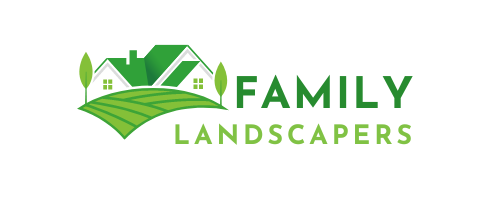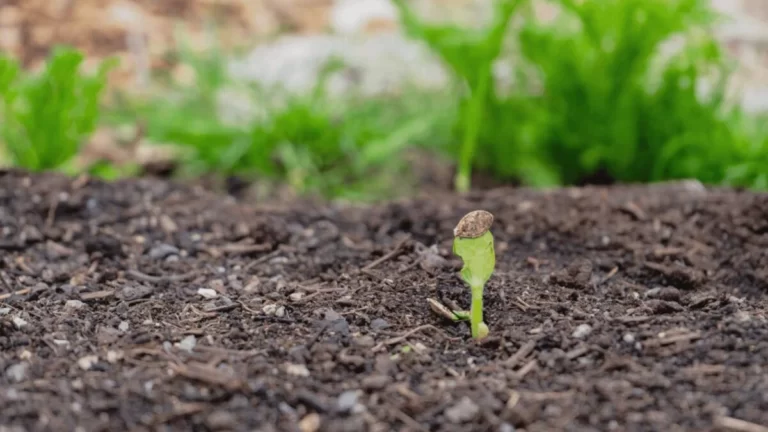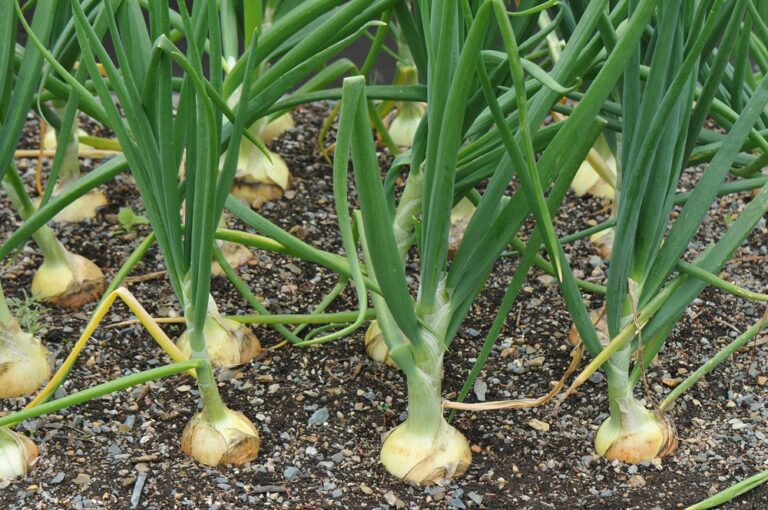Lemon balm (Melissa officinalis) is an herb in the mint family that has been used for centuries as an herbal remedy and flavoring agent.

It’s a perennial herb that can grow up to two feet tall and prefers moist soil with partial shade.
Its small, inconspicuous flowers usually appear during the summer months and are followed by flower buds that can be used in fruit salads.
The leaves of lemon balm are the star of this plant – they contain antiviral properties and have long been used to treat cold sores, menstrual cramps, and other ailments.
The leaves can also be dried and steeped in hot water to make lemon balm tea.
Lemon balm seeds are easily spread by wind or birds, making it easy to propagate lemon balm plants in your herb garden.
So is lemon balm invasive? While some other varieties of bee balm may become invasive if left unchecked, lemon balm is generally considered non-invasive when planted in a garden setting.
As long as you keep an eye out for spreading plants and prune any excess growth regularly, your lemon balm should remain under control.
Soil Types & Partial Shade Preferences
When growing lemon balm, it’s important to select the right type of soil and provide partial shade. T

The plant prefers moist, well-drained soil with a slightly acidic pH level.
A loamy soil that is rich in organic matter is ideal for lemon balm.
Partial shade is also recommended; too much direct sunlight can cause the leaves to become scorched. Lemon balm will thrive in areas where it can still receive some indirect light throughout the day.
For best results, mulch around the plants to help keep them cool and moist during the hot summer months.
Growth & Spread of Lemon Balm Plants
Lemon balm is a perennial herb in the mint family that typically grows to be about two feet tall. It produces small, inconspicuous flowers and has distinct lemon-scented leaves.
Lemon balm plants are easy to grow, and they spread quickly in moist soil.
While this makes them suitable for herb gardens, it can also lead to them becoming an invasive plants if not controlled properly.
To prevent your lemon balm from taking over your garden space, you should regularly trim it back when necessary and keep it away from other plants that you don’t want it to overtake.
Additionally, you should limit how much of the herb’s seed you allow to spread by deadheading any flower buds before they have the chance to turn into seeds.
Lemon balm has many uses that make it a desirable addition to gardens; its antiviral properties make it an effective herbal remedy for cold sores or menstrual cramps, while its fragrant leaves can also be used in fruit salads or brewed into a delicious tea.
Invasive Tendencies: Geographical Locations & Spread Rates
Lemon balm has been known to become invasive in certain areas, with its rapid spread rate and preference for moist soil.

While the plant is native to much of Europe and the Mediterranean, it has been naturalized in many other places around the world.
In the United States, lemon balm can be found in more than half of all states, particularly those in regions that have warm summers and mild winters.
The spread rate of lemon balm depends on several factors such as climate, soil fertility, and water availability.
For instance, a combination of hot temperatures and regular watering can promote the growth of this plant significantly more than cooler conditions or dry soil would.
Additionally, lemon balm spreads through its seeds which are dispersed by wind or animals; this means if you have mature plants nearby then they will likely spread quickly into your garden without any help from you.
Uses of Lemon Balm Plants in the Garden
Lemon balm plants are an attractive, perennial herb with small white flowers and fragrant, lemon-scented leaves.
These herbs can add a unique flavor to fruit salads, sauces, and tea. Growing in height from 12-24 inches tall, lemon balm plants prefer moist soil and partial shade.
They have inconspicuous flowers that form into small flower buds that eventually turn into fruits.
In addition to its culinary uses, lemon balm has long been used as an herbal remedy for the treatment of cold sores, menstrual cramps, and other conditions due to its antiviral properties.
The leaves can be brewed into tea or added directly to food dishes. It is also known to attract bees so it’s a great addition to any herb garden!
However, it is important to note that lemon balm can become invasive in certain areas so it should be planted with caution if you live in an area with warm summers and mild winters.
Conclusion
In conclusion, lemon balm is an attractive perennial herb with many culinary and medicinal uses. Its fragrant, lemon-scented leaves can add flavor to dishes while its antiviral properties can be used to treat certain conditions.
It is important to note that if grown in the right climate, it may become invasive so it should be planted with caution.
With proper care and maintenance, however, this plant can bring many benefits and make a great addition to any herb garden!






